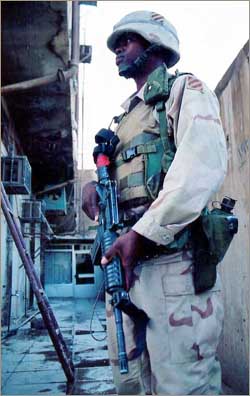 |
 |  |
|||||||||
 |
Home | The Sunni Heartland | The Unexpected War | Paying the Price |
|||||||||
|
The Unexpected War Combat Stress Reaction
"When a war-fighting outfit is suddenly, within the space of a few hours at times, called upon to be peacekeepers, it is very, very difficult," explains Knapp, "and they have trouble making that shift." Once a private clinic for Saddam Hussein's most senior aides, it was quickly Americanized. A soldier receptionist played video war games at the sign-in desk. The clinic specialized in treating combat stress reaction. Symptoms can be debilitating, including memory loss and frightening flashbacks. When the medical team first arrived, the caseload was one or two a day. It jumped to 18 a day when the 3rd Infantry Division got orders to stay in Iraq indefinitely says Colonel Knapp. "Doing things that you're trained to do," says Knapp, "is less stressful than doing things that you're not trained to do...Clearly, when the figures show that the need for combat stress control is during the peacekeeping phase and not the acute fighting phase, those figures can speak for themselves." Soldiers needed help coping with their fears and frustrations over the chaos of the country. Colonel Knapp and Major Beth Salisbury designed a treatment program to address the cultural misunderstandings between American soldiers who had sacrificed to liberate Iraq and a population that was growing increasingly hostile. "I think it is difficult for people to understand, not everybody is happy we're here," says Salisbury. "I think that is difficult sometimes even for me as a soldier to swallow... And trying to get them to look at a bigger picture of why that might be is a difficult task. Saying you know there are reasons why that might be is that they're frustrated because they have no electricity or their being rationed or they don't have water all the time...And I think it's really hard to get soldiers to understand that." Next: A Brilliant Con |
||||||||||
